L’univers de Julia Holter est mystérieux et rêveur, sauvage et mélodique… La musicienne/productrice américaine s’est forgée une forte identité sonore qui s’étend toujours plus avec chacun de ses albums. Après le très expérimental Aviery sorti en 2018 la musicienne revient avec Something in the Room She Moves (Domino) un opus expansif et profondément apaisant. Nous nous sommes entretenus avec elle peu avant la sortie de l’album. Nous avons parlé entre autres de collages, de maternité et des Beatles…
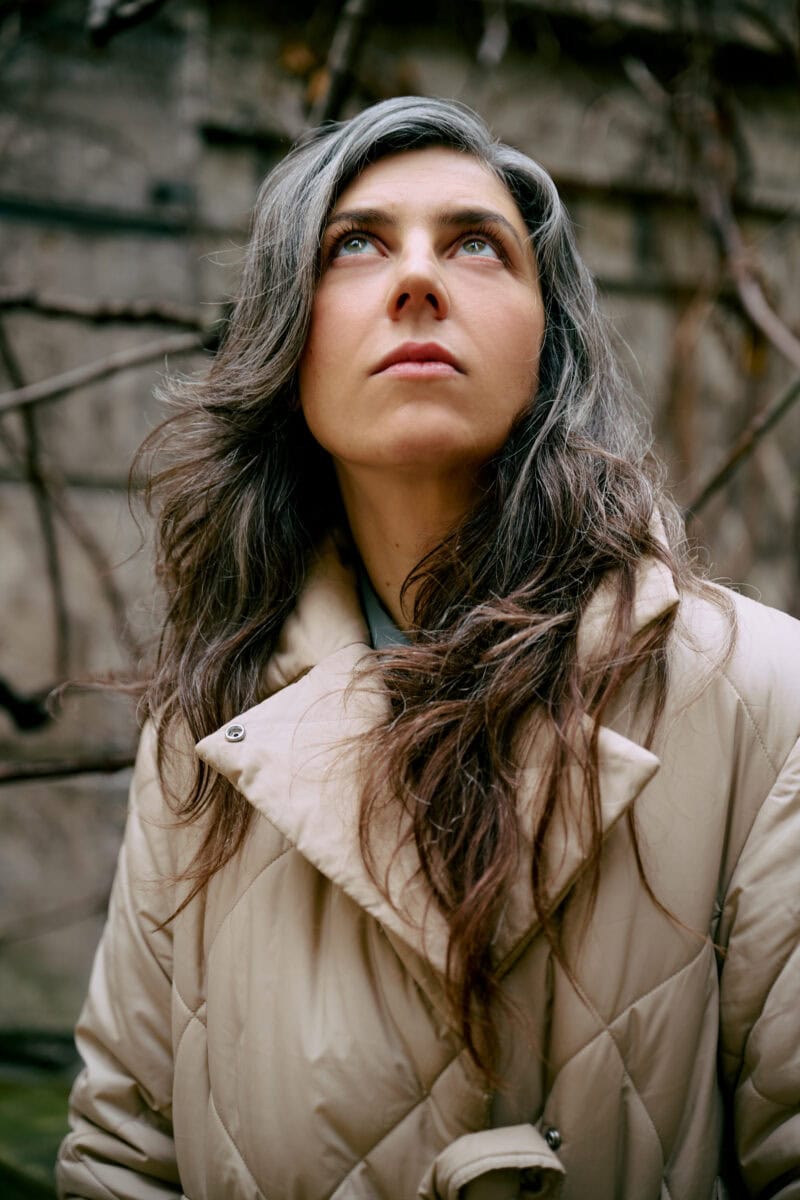
LFB : Salut ! Comment ça va ?
Julia Holter : Très bien !
LFB : Cinq ans se sont écoulés depuis Aviery, ton dernier album solo. Tu as fait une bande originale et un album en collaboration entre les deux, et je me demandais en quoi c’était différent pour toi de travailler sur un projet solo par rapport à une collaboration ou à une bande originale ?
JH : Oui, c’est vrai. Je n’y avais pas pensé, mais je crois que je n’ai pas travaillé sur mon propre projet pendant un certain temps. Et finalement, depuis que j’ai fini l’album, c’est-à-dire il y a un an – enfin, j’ai fini le mastering il y a moins d’un an – mais j’ai fini l’album il y a plus d’un an, donc j’ai eu beaucoup de temps. Je n’ai rien écrit non plus depuis (rires).
Je pense que c’est très agréable d’écrire et j’aimerais pouvoir le faire. J’essaie de m’y mettre davantage quand je le peux. Et c’est ce qui s’est passé pendant un moment. J’ai eu l’impression que je n’écrirais peut-être plus jamais de musique parce que mon changement de vie était si intense.
Quand tout change, on a l’impression que tout ne sera plus jamais pareil, mais ce n’est pas le cas. Et j’ai enregistré un disque. Dieu merci, c’est arrivé. Ça m’a fait du bien.
LFB : Tu parles de changements importants… est-ce que c’était la naissance de ta fille ?
JH : Oui, j’ai eu un enfant et c’était l’essentiel. Il y a eu la pandémie. C’était autre chose. Mais c’est arrivé en même temps, donc c’était assez chargé, comme… mon disque Aviery est sorti en 2018. Nous avons beaucoup tourné en 2018 et surtout en 2019.
Et j’étais aussi en tournée avec le groupe de mon mari, Tashi (Wada – ndr). Nous avons donc fait des tournées avec nos deux groupes pendant toute l’année 2019 et à la fin nous étions tellement fatigués.
Et puis soudain, j’étais enceinte, et puis soudain, c’était une pandémie, en même temps, en gros, au début de 2020. C’était donc beaucoup de changements. Tous ces changements m’ont pris du temps pour me remettre à écrire.
LFB : L’album a-t-il été influencé par tous ces éléments ?
JH : Oui, et j’avais commencé, en 2020, à écrire certains des éléments principaux des chansons qui sont là aujourd’hui. Mais celles dont je me souviens le mieux, et je pense dans celles qui ont été commencées pour l’album, c’est Something in the Room She Moves et Evening Mood. Elles sont parties du même rythme et se sont transformées en une chanson différente. J’ai commencé à écrire ces chansons au milieu de ce processus, quand tout changeait dans ma vie, mais j’ai eu du mal à continuer pour diverses raisons. Oui, ça a pris beaucoup de temps. Pour moi, il s’agissait vraiment de tout développer dans un album.
LFB : Il y a un fort aspect expérimental dans Something in the Room, She Moves et on le sent beaucoup plus apprivoisé – ce n’est peut-être pas le bon terme – qu’Aviery, un peu plus sauvage que Have You in My Wilderness et beaucoup moins angoissé que Loud City Song. Comment décririez-vous cet album par rapport aux précédents ?
JH : C’est très sensuel, plus sensuel je suppose. C’est la meilleure façon de le décrire. Ce qui m’intéressait vraiment c’était de capturer le sentiment… de capturer certains sentiments. Et ce point essentiel était différent pour moi par rapport aux autres albums. Je pense que dans le passé, j’ai aussi cherché à capturer un sentiment, mais je l’ai ressenti plus intensément avec cet album. Et je peux entrer dans les détails de tous les sentiments, mais oui, pour moi, c’est juste le fait de se concentrer sur cette sorte de capture de quelque chose, de capturer un sentiment et un son.
LFB : L’album est très apaisant. Il a beaucoup – comme dans beaucoup de ta musique – un aspect fantomatique, obsédant. Il est assez hypnotique et a une réelle qualité méditative. Je me demandais si la méditation jouait un rôle dans ta vie et dans le processus d’écriture ?
JH : J’aimerais bien ! Mon thérapeute me dit toujours de méditer, mais je n’y arrive pas. Et j’ai essayé, si tu me demandes littéralement si je médite, la réponse est tristement non, et j’y travaille.
LFB : D’accord (rires). As-tu une sorte de rituel d’écriture ?
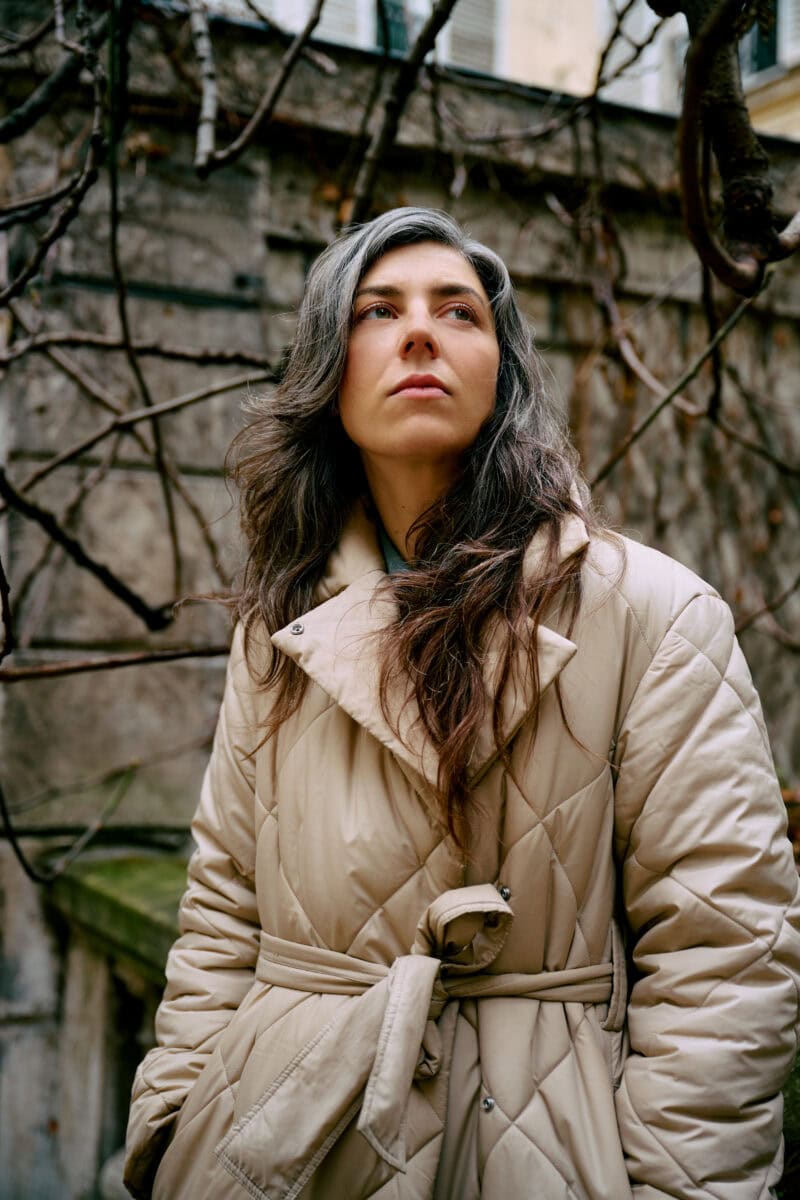
JH : Eh bien, oui. C’est différent pour chaque chanson, mais en général, j’aime bien commencer par… Je m’assois avec un micro sur ma voix et le clavier, et je joue sur le clavier – je veux dire, pardon, j’enregistre, je joue et je chante, et puis je reviens et j’enregistre. Une fois que j’ai l’impression d’avoir trouvé des idées intéressantes, ou au moins une idée intéressante, je m’arrête et j’enregistre le fichier.
Parfois, il y a d’autres éléments, par exemple s’il y a quelque chose de complexe au piano, je le note si nécessaire. La plupart du temps, j’enregistre, puis je transcris et plus tard, si je dois travailler avec des musiciens ou si j’ai besoin d’écrire la musique. Mais en fait, c’est le point de départ et ensuite je développe beaucoup la chanson. J’extrais la partie qui me plaît et je la développe.
Après avoir fait cela avec quelques chansons, je commence à voir des paternes émerger… Et cela m’aide pour les paroles parce que les paroles ne viennent jamais, en général. Parfois, il y a des paroles qui sont venues avec l’improvisation de la mélodie. Mais bien souvent, les paroles ne sont pas vraiment étoffées.
Une fois que je commence à avoir un sentiment général pour la chanson, je peux alors m’attaquer aux paroles. Et ça m’aide vraiment à trouver les paroles quand j’ai travaillé un peu plus sur d’autres chansons et que je peux commencer à voir des paternes et comprendre de quoi il s’agit.
Après l’enregistrement, je transcris la musique pour que d’autres personnes puissent la jouer et l’enregistrer.
LFB : Ton premier single Sun girl est très lumineux et apaisant. Peux-tu nous parler un peu de cette chanson ?
JH : Oui. Oui, c’est comme si je voulais littéralement capturer le son de la gaité et peut-être aussi un peu d’anxiété. J’ai passé beaucoup de temps, plus d’un an, à essayer de capturer cela, de trouver comment le faire. J’avais pour cette chanson des aspirations qui me semblaient parfois impossibles à réaliser. J’ai fait tellement de versions de cette chanson. Et même dans la version finale, presque finale, j’ai fini par détester la batterie. Je me suis dit qu’il fallait que je trouve une solution, et à la dernière minute, j’ai trouvé un meilleur motif de batterie, un peu plus minimal.
En fait, nous avons enregistré cette chanson en jammant et en faisant des choses amusantes en studio, puis je l’ai ramenée à la maison et j’ai fait des collages et j’ai fait de la programmation de batterie et tout ça. Je voulais vraiment obtenir cette essence d’énergie ludique.
LFB : Y a-t-il une chanson de l’album que tu aimes particulièrement, ou qui a une histoire ?
JH : Je pense que Ocean est une chanson que j’aimais écouter pendant la période de ma vie où j’ai fait cet album, une période un peu confuse. J’ai trouvé certaines choses très réconfortantes. L’une de ces choses, c’est, pour une raison ou une autre, j’ai improvisé des accords avec mon Nord, qui sont un peu ambiants – je n’aime pas ce mot parfois, mais “ambiant” est la meilleure façon de le décrire efficacement. C’était juste une improvisation que j’avais faite sur le Nord et c’était vraiment comme… c’était très basique et vraiment minimal. C’était vraiment apaisant pour moi, et je m’en suis servi comme base pour ce qui est devenu Ocean.
J’ai demandé à Chris Speed, qui joue sur l’album – il joue des vents, de la clarinette et du saxophone – et à Devin Hoff, à la basse. Ils sont venus, Dev a joué de la basse levée et ils ont simplement répondu. Je ne sais pas s’ils avaient déjà entendu la chanson auparavant, je ne leur ai pas jouée à l’avance. J’ai simplement appuyé sur « enregistrer ». C’est donc comme s’ils répondaient à la musique individuellement. Ils ne jouaient pas ensemble mais réagissaient au morceau. C’était donc une sorte de collaboration que je leur ai imposée (rires)… sans aucune direction, si ce n’est que j’avais ce morceau auquel il fallait répondre, ce qui est une forme de direction, je suppose… Mais oui, j’ai vu cette chanson comme une collaboration et je l’ai trouvée apaisante, elle a une belle qualité.
LFB : Le titre de l’album a un côté mystique. On peut imaginer l’objet en mouvement avant qu’on ne visualise une personne bougeant l’objet. Peux-tu nous en dire un peu plus sur ce titre ? (Notes du communiqué de presse : “Le titre de son album réinvente la perspective des paroles des Beatles (« Something in the way she moves… »)”)
JH : Oui. La première fois que j’ai enregistré Something In the Room She Moves, j’ai improvisé ce qui est devenu cette chanson, j’ai enregistré le fichier du projet sous le nom de « Something in the Room She Moves », je ne sais pas pourquoi. Il m’est venu comme ça. Et puis j’ai continué à y revenir parce que ça m’intéressait. Il m’a intrigué. Et puis j’ai trouvé ça assez drôle aussi, et j’adore les Beatles. Ce n’est pas une référence aux Beatles, mais leur musique occupe une place particulière dans mon cœur. Il n’y a peut-être rien sur l’album qui se réfère spécifiquement à eux, à part ça, c’est juste un moment… ils m’ont momentanément traversé l’esprit et je les ai gardés là à ce moment-là.
Et j’aime ça. J’ai aimé offrir cela à l’album parce que je voulais qu’il soit ludique. Et après ça, j’ai continué à avoir des envies de Beatles. Les Beatles sont l’une des rares musiques dont je connais toutes les paroles parce que je les écoutais quand j’étais enfant. Je pouvais donc facilement chanter cela à ma fille quand elle s’endormait.
Et puis j’ai aussi beaucoup aimé le documentaire Get Back en 2021. Et cela m’a inspirée à un moment où j’avais besoin d’inspiration créative.
Donc je pense que c’est comme s’ils continuaient à me venir à l’esprit à cause de ma situation de vie ou quelque chose comme ça, et donc je me suis dit « pourquoi ne pas le laisser ? » et c’est le titre donc…
Ça devait être « Materia », ça devait être le titre, et puis je l’ai changé. J’aime beaucoup ce titre et il serait beaucoup plus facile de l’appeler comme ça, mais c’est aussi du latin, et je me suis dit « Je ne sais pas si j’ai envie d’avoir d’autres conversations sur l’antiquité », donc je ne l’ai pas fait et j’ai pensé que Something in the Room She Moves était beaucoup plus chaleureux et drôle et qu’il reflétait mieux l’album.
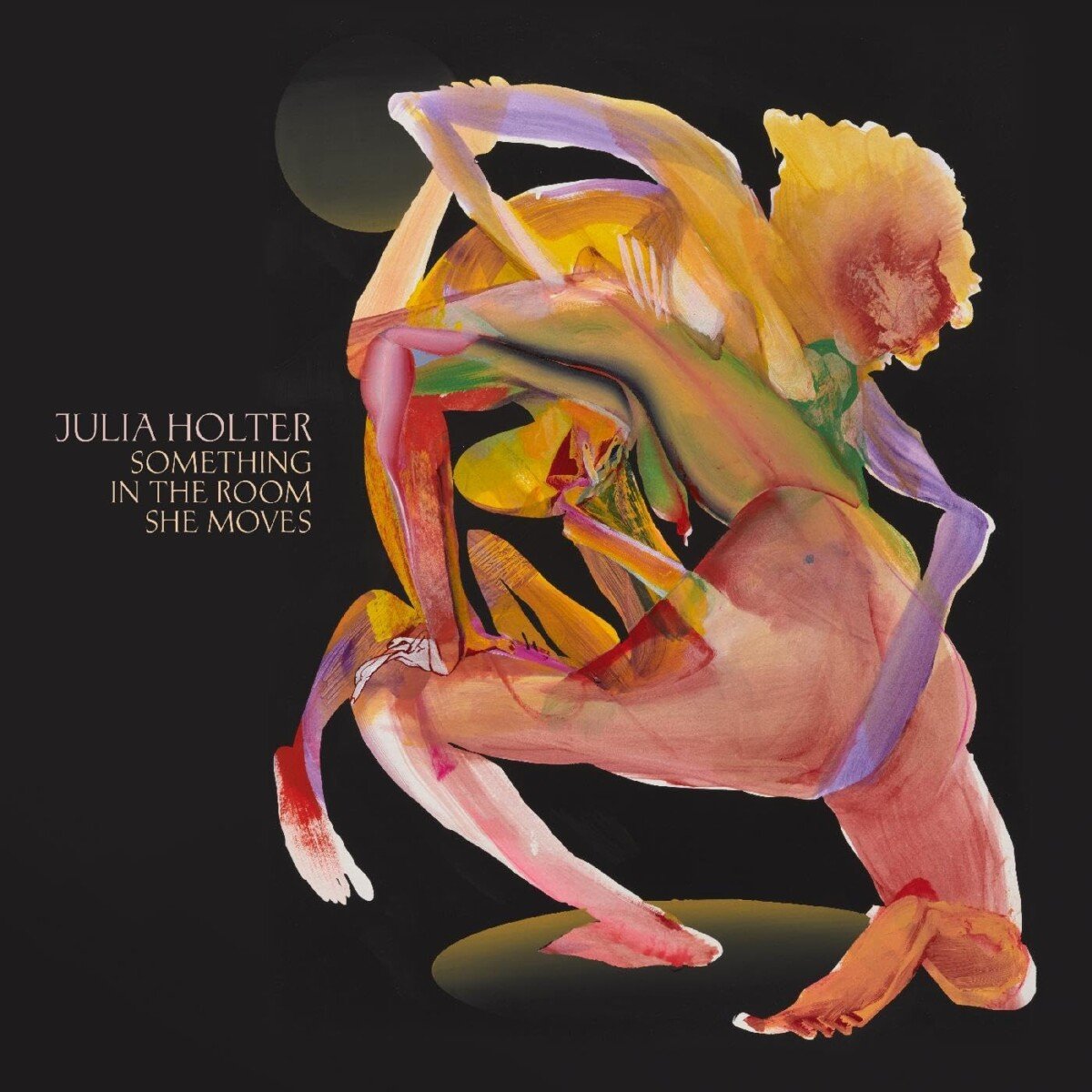
LFB : En parlant de coléoptères (“beetles”)… La peinture sur la couverture ressemble à des lutteurs nus et pour moi cela ressemble presque à des insectes, on dirait une mante religieuse ou quelque chose comme ça. Es-tu d’accord ou c’est juste moi ? Peux-tu nous parler de cette peinture ?
JH : Oui, Christina Quarles est l’artiste. Quand j’ai commencé à réfléchir à ce que j’allais mettre sur la couverture j’étais vraiment perdue parce que je voulais vraiment capturer ce corps. Je voulais vraiment représenter le corps viscéral. Mais j’essayais d’imaginer cela comme une photo ou quoi ?… comme quoi… je n’arrivais pas à trouver comment le faire. Je voulais vraiment que ce soit quelque chose que l’on puisse toucher ou quelque chose d’intensément viscéral et corporel. Et je me disais : une photo de corps ne va pas marcher, ou une photo de tripes, ou quelque chose de bizarre… Je me disais « je n’arrive pas à trouver ce qui serait assez intense ! »
Et puis j’ai pensé au travail de Christina parce que c’est une amie d’enfance et que je connais bien les personnages qu’elle dessinait, même quand nous étions enfants. Elle dessine des personnages de façon incroyable, comme de vieilles peintures, mais la façon dont elle dessine les personnages est tellement incroyable, capturant toutes les couches et les multiplicités de l’être dans ces personnages. Qu’est-ce qu’ils font ? Est-ce qu’ils ont des relations sexuelles ? Ou est-ce qu’ils se battent l’un l’autre ? Ou que se passe-t-il ? Est-ce violent ou sensuel, ou qu’est-ce que c’est ? Est-ce que c’est romantique ? Donc je me suis dit que j’aimais vraiment ça. J’ai trouvé cela parfait. Et c’était une de ses peintures qui existait déjà et qu’elle m’a gentiment laissée utiliser sur ma couverture.
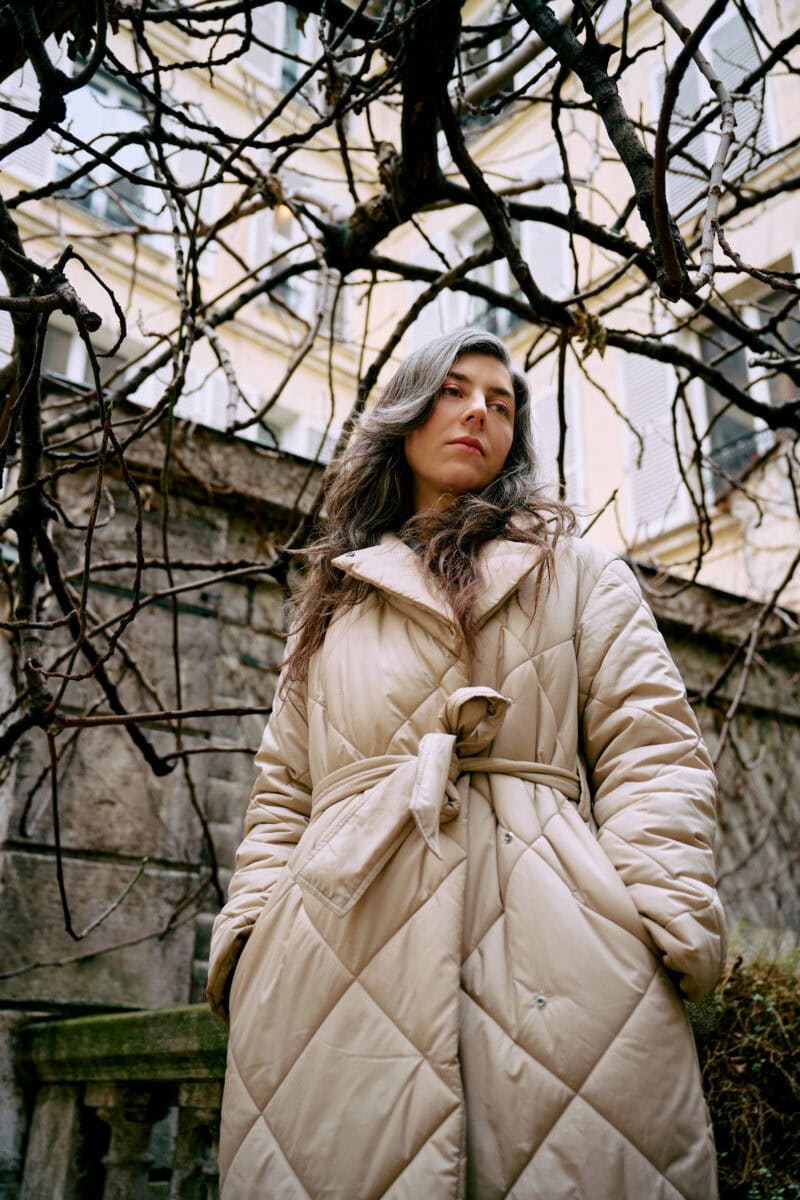
LFB : Ta musique est très riche et très expansive. Et elle est très complexe à jouer live. Je me demandais si parfois tu souhaitais écrire de la musique plus simple et avoir la vie facile. Ou est-ce que c’est toujours un plaisir de jouer et de s’épanouir sur scène ? Comme je suppose que lorsque tu es en tournée, tu dois gagner beaucoup de choses.
JH : Oui, j’ai toujours aimé faire des choses différentes pour le concert. Pour moi, il n’y a pas de problème. Lorsque j’enregistre, je ne pense pas à la façon dont nous allons nous produire et je ne m’en préoccupe pas encore. Je fais ce que je veux parce que c’est un processus tellement différent. Je ne m’inquiète jamais trop à ce sujet, et on s’en rend compte plus tard, et je peux changer des choses en live ou autre.
LFB : Oui, c’est très complexe, je t’ai vue plusieurs fois et c’est vraiment impressionnant à chaque fois.
JH : C’est aussi grâce aux autres musiciens avec lesquels je travaille, qui sont vraiment de grands musiciens.
LFB : Oui, c’est incroyable !
Tu étais à Paris pour une soirée d’écoute et de dédicace et je me demandais si tu avais d’autres dates de prévues en France pour cet album ?
JH : Oui, il y a d’autres dates qui vont être annoncées. Mais il y en a un à Nantes*. C’est un festival. Mais oui, je ne sais pas encore, mais c’est sûr, oui. Nous jouerons à Paris dans le courant de l’année.
*Ndr : Variations Festival, Nantes, dimanche 7 avril.
LFB : Super !
Et ma dernière question est la suivante : qu’est-ce qui t’intéresse en ce moment ? Musicalement, en général ou dans la vie en général ?
JH : J’essaie d’enseigner pour la première fois. Non, ce n’est pas vrai. Mais j’enseigne. Je n’ai pas beaucoup d’expérience et j’apprends donc beaucoup sur l’enseignement, et c’est un processus très intéressant. Parce qu’il faut utiliser une autre partie du cerveau pour être un bon professeur. J’ai l’impression que c’est quelque chose sur lequel j’essaye de travailler. C’est comme si je réfléchissais à la manière d’enseigner.
LFB : D’accord. Et des livres ou des albums que tu as lus ou écoutés ?
JH : J’ai lu le livre de Rashid Khalidi sur La Guerre de 100 ans Contre La Palestine. À cause de tout ce qui se passe, c’est intéressant. Parce que mon pays est très impliqué dans cette guerre et que c’est très intéressant d’en savoir plus.
J’ai terminé ce livre de Joan Didion qui s’appelle L’année de la Pensée Magique (The Year of Magical Thinking), qui parle du deuil et c’est très intéressant de connaître ses états psychologiques. Et elle a vraiment disséqué tout ça au milieu du chagrin, et j’ai trouvé ça très intéressant.
LFB : Merci beaucoup !
Suivre Julia Holter sur Instagram.
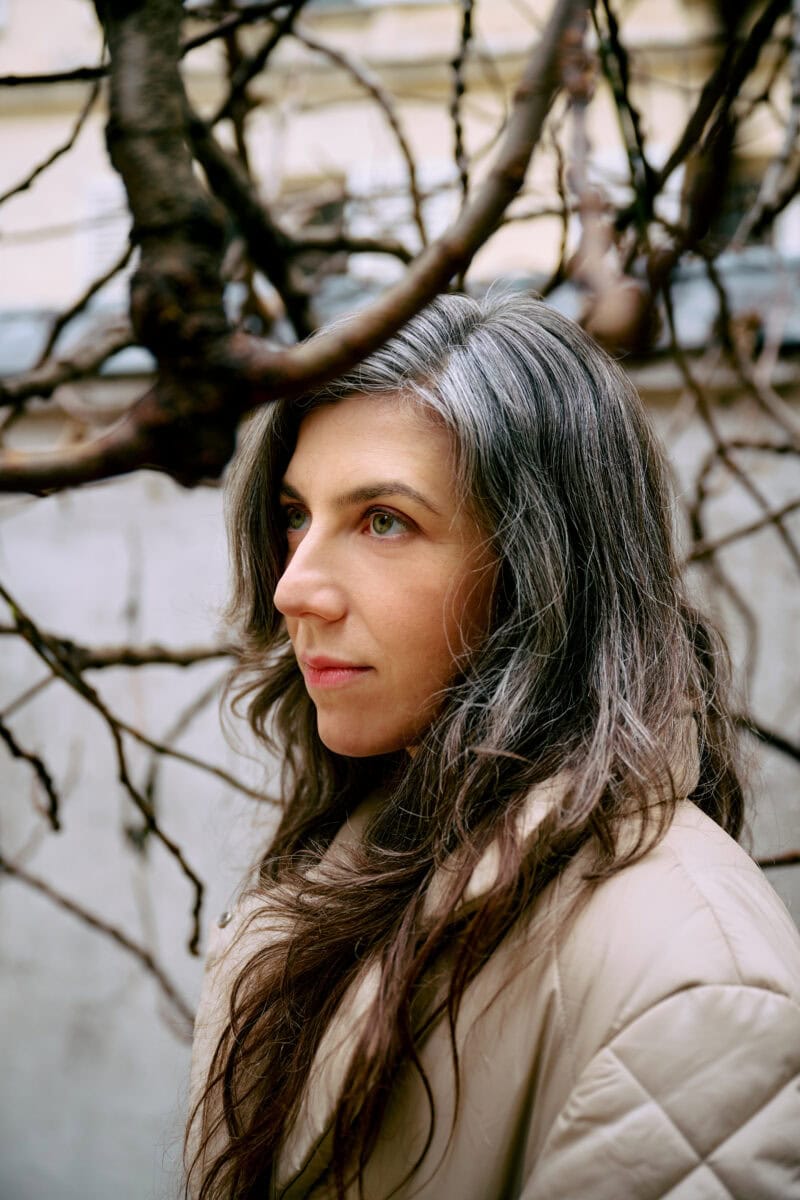
ENGLISH VERSION (V.O.)
Julia Holter’s universe is mysterious and dreamy, wild and melodic… The American musician/producer has forged a strong sonic identity that expands ever further with each of her albums. After the highly experimental Aviery released in 2018 the musician returns with Something in the Room She Moves (Domino) an expansive and deeply soothing opus. We spoke to her shortly before the album’s release. We talked about collages, motherhood and the Beatles…
LFB: Hey, how are you?
Julia Holter: Okay, good!
LFB: It’s been five years since Aviery, your last solo album. You’ve done a soundtrack and you’ve done a collaborative album in between, and I was wondering how is it different for you to work on a solo project compared to collaborating or doing a soundtrack?
JH: Yeah, I mean, that’s true. I hadn’t thought about it like that, but I guess I didn’t work on my own thing for a while. And actually, finally, since I finished the record, which was like a year ago – well, I finished mastering it less than a year ago – but I finished the record otherwise, like over a year ago, so I had a lot of time. I also have not written anything since (laughs).
So I think it feels really good to write and I wish I can. I try and do like, get it into it more when I can. And it did for a moment. It felt like maybe I’m never gonna write music again because my life shift was like, so intense.
And so when everything changes, it like, makes you feel like everything’s never gonna be the same again, but it’s not like that. And I did actually make a record. So thank God it happened. So it felt good.
LFB: You talk about strong shifts… was this the birth of your daughter?…
JH: Yeah, I had a child and that was the main thing. There was the pandemic. That was another thing. But they happened at the same time, so it was just like, complete, like… we had my record Aviery came out 2018. We toured a lot in 2018 and mostly 2019.
And I was also touring with my husband, Tashi (Wada – ndr)‘s band. So we were touring each other bands that whole year 2019 and by the end, we were so tired.
And then suddenly I was pregnant, and then suddenly it was a pandemic, at the same time, basically, in early 2020. So it was just a lot of change. So all that change took me a while to really get to writing again.
LFB: So was the album influenced by all these elements?
JH: Well, yeah, and I had started, I mean in 2020, writing some of the main elements of the songs that are there today. But the ones I remember the most starting and I think they were started for the record were like, Something in the Room She Moves and Evening Mood. Those ones actually started from the same beat and then turned into a different song. I started those kind of in the middle of that, like process when everything was changing, whatever in my life but it was kind of hard to follow up for various reasons. And so yeah, it took a long time. For me to really develop everything into a record.
LFB: There’s a strong aspect of experimentation in Something in the Room, She Moves and it feels a lot more tamed – maybe it’s not the right term but – than Aviery, and it’s a bit wilder than Have You in My Wilderness and a lot less distressed than Loud City Song. How would you describe the album compared to your previous ones?
JH: It feels very sensual, like it feels more sensual I guess. It’s the best way to describe it. I was really interested in capturing the feeling… capturing certain feelings. And that like very essential focus was different for me than on the other records maybe. I do think in the past I’ve also been interested in capturing a feeling but it felt more intensely so with this record. And I can go into detail about all the feelings but yeah, that to me is like just the focus on this sort of like capturing something capturing a feeling and in a sound.
LFB: The album has a very soothing feel. It has a lot – as in most of your music – it has quite a ghostly, haunting aspect about it. It’s quite hypnotic and has a real meditative quality about it. And I was wondering if meditation was taking a role in your life and in the writing process?
JH: I wish! My therapist is always telling me to meditate and I like could not do it. And I’ve tried if you’re literally asking me if I meditate the answer is like sadly no, and I’m working on it.
LFB: Okay, good (laughs). And do you have a kind of writing ritual or is it just as you can?
JH: Well, yeah. I mean, it’s different for every song but in general, I like to start with… I sit down with a mic on my voice and the keyboard and I play into the keyboard – I mean, sorry, I record and I play and sing, and then I come up and like record it. And then once I feel like I’ve gotten some interesting ideas or at least one interesting idea I stop and I save the file.
And then sometimes there’s other elements like maybe if there’s something kind of intricate on the piano I will notate it if I need to. But most of the time it’s like recording and then I will transcribe and later if I’m going to work with musicians or need to write it out the music. But basically like that’s the starting point and then I will develop the song a lot. I’ll extract the part that I liked, and then develop that.
Then I kind of like start to see after I do this with a few songs then I can see patterns emerging… And that helps me with the lyrics because the lyrics never come yet, usually. Sometimes the lyrics are,like there’s some lyrics in there, that came with the improvisation of the melody. But a lot of times the lyrics aren’t really fleshed out much at all. So once I start to get an overall feeling for the song, then I can get to lyrics. And it definitely helps me figure out the lyrics more when I have other songs worked on a little more too and then I can start to see patterns and like what things are about.
Then after recording I then I transcribe the music for other people to play and record it.
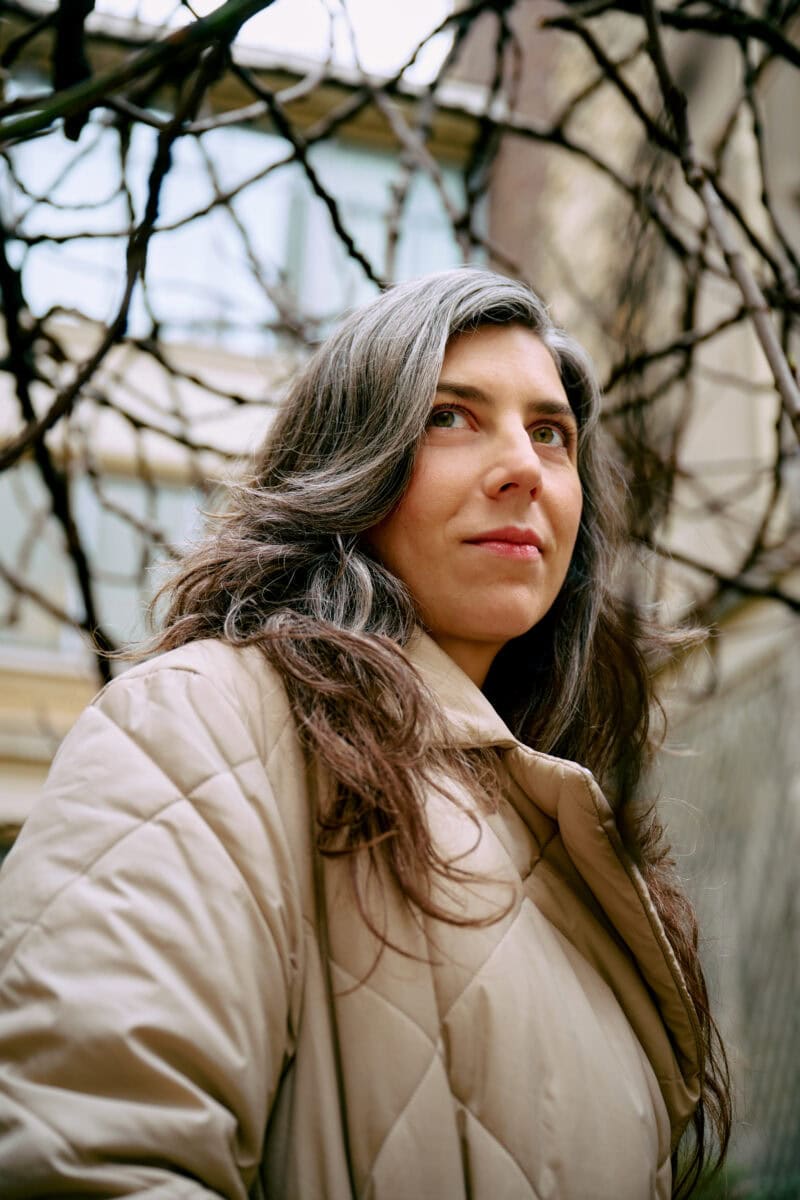
LFB: Your first single Sun girl is very luminous and it feels really soothing. Can you can you tell us a bit about the the song?
JH: Yeah. Yeah, it’s like I wanted to literally just like capture the sound of playfulness and like maybe a little anxiety in there too. So I spent like so long, over a year, like trying to capture this, figure out how to do that. And I like had these aspirations for this song that sometimes felt impossible. I made so many versions of this song. And even like the final version of it, almost final version, I like ended up hating the drums. I was like, I have to figure this out at the last minute I came up with a better, a little more minimal drum pattern.
So it was a lot of work on that one and a lot of like… basically we recorded as like jamming doing funny stuff in the studio, and then I took it back home and mess with it and just totally collage stuff all together and mess with it a lot did drum programming and all this stuff. So I really wanted to like just get that essence of like playful energy.
LFB: Is there a song on the album that you specially like, or that has a story behind?
JH: I think Ocean is one that I like to listen to, like, during this period of my life when I was making this record, which was a little confusing time period. I’ve found certain things very comforting. And one of those things was for some reason these chords that I come up with my Nord that I improvised, that are kind of a little like ambient in a way – I don’t like that word sometimes but ambient is the best way to describe it efficiently. And I would like listen to it all the time and it was just this improvisation I’d done on the Nord and it was really like… it was very basic and really minimal. And it really was soothing for me, so then I used that as the basis for what became Ocean.
And I asked Chris Speed who plays on the record – he plays the winds, he plays the clarinet and the saxophone – and I asked Devin Hoff on bass. They came in, Dev played upright bass and they just responded. I don’t know if they’d ever heard the song before so that I just like didn’t play it for them beforehand. I just pressed record. So that’s like them responding individually. They weren’t playing together but responding to the track. And so it was kind of like a collaboration that I forced on them (laughs)… without any direction except that I had that track to respond to, which is kind of a form of direction, I guess… But yeah, so I kind of saw that one as a collaboration and just I find it kind of soothing, it’s kind of a nice quality to it.
LFB: The title of the album has an eerie feel. One can imagine the object moving before it actually visualised, like someone doing this. Can you can you tell a bit about this title? (Press release notes: « The title of her album reinvents the perspective of the Beatles’ lyrics (« Something in the way she moves… ») »).
JH: Yeah. So I recorded this song that became Something In the Room She Moves I recorded like… the first time I recorded like, myself improvising what became that song, I had to save the project file so it saved as “Something in the Room She Moves”, I don’t know why. It just came to me. And then I kept like, coming back to it because it was like, interested me. And so I just was intrigued by it. And then I thought it was kind of funny also, and I love the Beatles. It’s not a reference to The Beatles, but I do have a lot of special place in my heart for their music. So possibly there’s some like there’s nothing on the album specifically referring to them aside from that, it’s just a momentary… they momentarily crossed my mind and I kept them there that moment.
And I like that. I like just like supplying that to the record because I wanted it to be playful. And I also just had after that, I kept having these like Beatles things. Like, The Beatles were like one of the few l musics where I know all the words because I used to listen to them as a kid. So I could easily sing that to my daughter when she went to sleep.
And then also like then I got really into the Get Back the documentary, in 2021. And that was inspiring for me at a time where I think I needed some creative inspiration.
So I think it’s just like they just kept coming up because of my life situation or something and and so I thought why not just leave it and that’s the title so…
It was going to be “Materia”, that was gonna be the title and then I changed it. I like it a lot and it’d be a lot easier to just call it that, but it’s also like Latin, and I just was like “I don’t know if I want to have more conversations about antiquity”, so I kind of like didn’t do that and I thought that Something in the Room She Moves is a lot warmer and funny and reflected the album better.
LFB: And talking about beetles… The painting on the cover looks like naked wrestlers and to me it’s almost like insects it like it looks like praying mantis or something. Do you agree or is it just me? Can you can you tell us about the the artwork of it?

JH: Yeah, so Christina Quarles is the artist. When I was first trying to think of what to put on the cover, I was like really confused because I really wanted to capture this body thing. I really wanted to be kind of like the visceral body. But like I was like trying to imagine that as a photo or what?… like what… I couldn’t figure out how to do that. Like I really wanted it to be kind of like something you could touch or something kind of intensely like visceral and body. And I was like, a photo of a body sounds terrible or like a photo of like guts or like something gnarly like… I was like, I can’t think of what would be intense enough!
And then I thought of Christina’s work because she’s a childhood friend of mine and I’m familiar with her figures that she’s drawn even when we were kids. She does such an amazing figure drawing – I mean it’s not figure drawing – It’s like old paintings but the way she draws figures is so incredible, capturing like all of these layers and multiplicities of being in these figures. And what are they doing? and are they like having sex? or are they like, beating each other up? Or what is going on? Is it violent or like sensual, or what is this? Or like romantic? So I was like, I really liked that. I thought that was perfect. And this is a painting of hers that already exists that she kindly let me use on my cover.
LFB: And your music is very rich and expansive. And it’s very complex to play live. And I was wondering if sometimes you wish you’d write simpler music and have it easy. Or is it always a pleasure to play and expand onstage like I guess when you’re touring you you mus gain as well a lot.
JH: Yeah, I’ve always enjoyed doing different stuff for the live show. So there’s no problem for me. I when I’m recording I don’t think about how we’re going to perform and I don’t worry about it yet. I do whatever I want because it’s such a different process. Like recording performing or just completely different to me so I never worry too much about it and then we just figure it out later and I can change things live or whatever.
LFB: Yeah, it looks very intricate and very complex, I’ve seen you a couple of times and yeah, it’s really impressive every time.

JH: It’s also the other players I work with really great musicians.
LFB: Yes, incredible!
You were in Paris for a listening party and a signing event and I was wondering if you are planning to play any date in France for this album?
JH: Yeah, there’s more dates that are going to be announced. But there’s one in Nantes*. It’s a festival. But yeah, I don’t know yet but definitely, yes. We’ll be playing in Paris sometime this year.
*Editor’s note: Variations Festival, Nantes, Sunday 7 April.
LFB: Great!
And my last question is: What are you into at the moment? Like musically or in general or in life in general?
JH: Well, I’m trying to I’m teaching for the first time. No, that’s not true. But I’m teaching. I’m not super experienced and so I’m learning about teaching a lot and it’s a very interesting process. Because it requires a different part of the brain I think to be a good teacher. I feel that’s something I’ve been trying to work on. It’s like, thinking about how to teach.
LFB: Okay, alright! And any books or album that you’ve been reading or listening to?
JH: I’ve been reading that Rashid Khalidi book about The 100 years War on Palestine. Because of everything that’s been going on which has been interesting. Because my country’s so involved in this war and it’s been really interesting to learn about.
And I’ve been reading I finished this book by Joan Didion call looks like a really famous one called The Year of Magical Thinking, and it’s about grieving and it’s very interesting to sort of like hear about her psychological states. And she just really dissect that all amidst grief, and yeah, found it really interesting.
LFB: Thank you very much!
